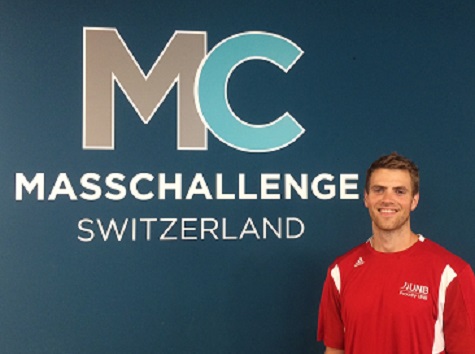Thomas Bird used a trip to Israel to make sure his Fredericton-based company SM-Heart was accepted into the MassChallenge Accelerator in Geneva, Switzerland.
This globe-trotting startup is developing an ankle bracelet that monitors swelling in the lower leg, which can be a key indicator of heart failure. The company now has a working prototype and hopes that within a couple years it will have the medical device on the market in Canada and northern Europe.
One of the institutions that is helping Bird move toward the market is MassChallenge, a global accelerator that holds training sessions in such centres as Boston, Geneva, Tel Aviv and other places. It bills itself as “the most startup-friendly accelerator on the planet,” and has graduated more than 1,200 startups in seven years. It’s believed SM-Heart is the first Atlantic Canadian startup to enter the program, and Bird says his application came together quickly.
“In March, I saw that the deadline for the MassChallenge applications was due the next day, so I put together an application as fast as I could,” said Bird in an interview from Switzerland last week. “I got an email saying I made it through the first round. I was at a conference in Tel Aviv, so we did the interview in Jerusalem.”
Jaza, SomaDetect Enter CIX Top 20
The technology that won SM-Heart a place at Mass Challenge solves a problem that means a lot to Bird. He lost his grandfather to heart disease a few years ago. So when he entered the masters of technology, management and entrepreneurship program at University of New Brunswick, he made it his mission to design a product that would help people suffering from heart failure.
Heart failure is a weakening of the heart that causes too little blood to be pumped through the body. One of the symptoms is a swelling around the ankle as the heart is not strong enough to pump blood out of the lower extremities. Sometimes, this goes unnoticed. Bird worked with a fellow student to design a light-weight, non-intrusive anklet that would alert people if there was swelling in the ankle. That would ensure early detection, which improves the chances of recovery.
The anklet can be worn by people who have a history of heart problems or those in high-risk groups.
As he went through MassChallenge, Bird’s mentors and the physicians he interviewed encouraged him to increase the functionality of the product so it can detect more than just heart failure. So the company is now enhancing the product so it can detect other diseases such as diabetes.
Bird says the medical device community in Switzerland is second to none. He has planned to seek regulatory approval for the device, first in Canada and northern Europe. He said those would be the easiest jurisdictions to gain regulatory approval. The clinical work needed for regulators is probably a little ways off.
“We’re still in the research and development phase and we’re doing our own internal testing right now,” said Bird. “We want everything to be optimal before anything is done in a clinical setting. We’re probably 18 months away from an actual clinical test.”










